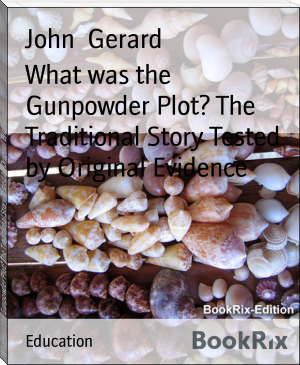What was the Gunpowder Plot? The Traditional Story Tested by Original Evidence by John Gerard (top 10 most read books in the world .TXT) 📕

Read free book «What was the Gunpowder Plot? The Traditional Story Tested by Original Evidence by John Gerard (top 10 most read books in the world .TXT) 📕» - read online or download for free at americanlibrarybooks.com
- Author: John Gerard
Read book online «What was the Gunpowder Plot? The Traditional Story Tested by Original Evidence by John Gerard (top 10 most read books in the world .TXT) 📕». Author - John Gerard
Moreover, Monteagle's services received most substantial acknowledgment in the form of a grant of £700 a year,[243] equivalent, at least, to ten times that amount in money of the present day.[244] There still exists[245] the draft preamble of the grant making this award, which has been altered and emended with an amount of care which sufficiently testifies to the importance of the matter. In this it is said of the letter that by the knowledge thereof "we had the first and only means to discover that most wicked and barbarous plot"--the words italicised being added as an interlineation by Cecil himself. Nevertheless, it appears certain that this is not, and cannot be, the truth; indeed, historians of all shades equally discountenance the idea. Mr. Jardine[246] considers it "hardly credible that the letter was really the means by which the plot was discovered," and inclines to the belief[247] that the whole story concerning it "was merely a device of the government ... to conceal the means by which their information had been derived." Similarly Mr. J.S. Brewer[248] holds it as certain that this part, at least, of the story is a fiction designed to conceal the truth. Mr. Gardiner, who is less inclined than others to give up the received story, thinks that, to say the least of it, it is highly probable that Monteagle expected the letter before it came.[249]
For a right understanding of the point it is necessary to consider the character of the man who plays so important a part in this episode. Lord Monteagle, the eldest son of Lord Morley, ennobled under a title derived through his mother, was, in Mr. Jardine's opinion,[250] "a person precisely adapted for an instrument on such an occasion;" and the description appears even more applicable than was intended. He had been implicated in all the doings of the turbulent section of the English Catholics[251] for several years, having taken part in the rising of Essex, and in the Spanish negotiations, whatever they were, conducted through the instrumentality of Thomas Winter. With Catesby, and others of the conspirators, he was on terms of the closest and most intimate friendship, and Tresham was his brother-in-law. A letter of his to Catesby is still preserved, which, in the opinion of some, affords evidence of his having been actually engaged in the Powder Plot itself;[252] and Mr. Jardine, though dissenting from the view that the letter proves so much, judges it not at all impossible or improbable that he was in fact privy to the conspiracy. It is likewise certain that up to the last moment Monteagle was on familiar terms with the plotters, to whom, a few days before the final catastrophe, he imparted an important piece of information.[253]
At the same time it is evident that Monteagle was in high favour at Court, as is sufficiently evidenced by the fact that he was appointed to be one of the commissioners for the prorogation of October 3rd, a most unusual distinction for one in his position, as also by the pains taken by the government on behalf of his brother, who had shortly before got himself into trouble in France.[254] A still more remarkable circumstance has been strangely overlooked by historians.[255] Monteagle always passed for a Catholic, turbulent indeed and prone to violence, but attached, even fanatically, to his creed, like his friend Catesby and the rest. There remains, however, an undated letter of his to the king,[256] in which he expresses his determination to become a Protestant; and while in fulsome language extolling his Majesty's zeal for his spiritual welfare, speaks with bitterness and contempt of the faith which, nevertheless, he continued to profess to the end of his life, and that without exciting suspicion of his deceit among the Catholics. Not only must this shake our confidence in the genuine nature of any transaction in which such a man played a prominent part, it must likewise suggest a doubt whether others may not in like manner have passed themselves off for what they were not, without arousing suspicion.
The precise facts as to the actual receipt of the famous letter are involved, like every other particular of this history, in the obscurity begotten of contradictory evidence. In the published account,[257] it is stated with great precision that it was received by Monteagle on Saturday, October 26th, being but ten days before the Parliament. In his letter to the ambassadors abroad,[258] Cecil dates its receipt "about eight days before the Parliament should have begun." In the account furnished for the benefit of the King of France,[259] the same authority declares that it came to hand "some four or five days before." A doubt is thus unquestionably suggested as to whether the circumstances of its coming to Monteagle's hands are those traditionally described: for our present purpose, however, it will perhaps be sufficient to follow the story as formally told by authority in the king's own book.
On Saturday, October 26th, ten days before the assembly of Parliament, Monteagle suddenly, and without previous notice, ordered a supper to be prepared at his house at Hoxton "where he had not supped or lain of a twelvemonth and more before that time."[260] While he was at table one of his pages brought him a letter which had been given to him by a man in the street, whose features he could not distinguish, with injunctions to place it in his master's own hands. It is undoubtedly a singular circumstance, which did not escape notice at the time, that the bearer of this missive should have thus been able to find Monteagle at a spot which he was not accustomed to frequent, and the obvious inference was drawn, that the arrival of the letter was expected. On this point, indeed, there is somewhat more than inference to go upon, for in Fulman's MS. collection at Corpus Christi College, Oxford, among some interesting notes concerning the Plot, of which we shall see more, occurs the statement that "the Lord Monteagle knew there was a letter to be sent to him before it came."[261]
Monteagle opened the letter, and, glancing at it, perceived that it bore neither date nor signature, whereupon he handed it to a gentleman of his household, named Ward, to read aloud, an apparently unnatural and imprudent proceeding not easy to explain, but, at least, inconsistent with the conduct of one receiving an obviously important communication in such mysterious circumstances. The famous epistle must be given in its native form.
My lord out of the love i beare to some of youere frends i have a caer of youer preseruacion therfor i would advyse yowe as yowe tender youer lyf to devys some excuse to shift of youer attendance at this parleament for god and man hath concurred to punishe the wickednes of this tyme and think not slightlye of this advertisment but retyre youre self into youre contri wheare yowe may expect the event in safti for thowghe theare be no apparence of anni stir yet i saye they shall receyve a terrible blowe this parleament and yet they shall not seie who hurts them this cowncel is not to be contemned because it maye do yowe good and can do yowe no harme for the dangere is passed as soon as yowe have burnt the letter and i hope god will give yowe the grace to mak good use of it to whose holy proteccion i comend yowe
(Addressed) to the ryht honorable the lord mo[=u]teagle
Monteagle, though he saw little or nothing in this strange effusion, resolved at once to communicate with the king's ministers, his Majesty being at the time engaged at Royston in his favourite pastime of the chase, and accordingly proceeding at once to town, he placed the mysterious document in the hands of the Earl of Salisbury.[262]
As to what thereafter followed and the manner in which from this clue the discovery was actually accomplished, it is impossible to say more than this, that the accounts handed down cannot by any possibility be true, inasmuch as on every single point they are utterly and hopelessly at variance. We can do no more than set down the particulars as supplied to us on the very highest authority.
A.--The account published in the "King's Book."
The letter was received ten days before the meeting of Parliament, i.e., on October 26th. The Earl of Salisbury judged it to be the effusion of a lunatic, but thought it well, nevertheless, to communicate it to the king. This was done five days afterwards, November 1st, when, in spite of his minister's incredulity, James insisted that the letter could intend nothing but the blowing up of the Parliament with gunpowder, and that a search must be made, which, however, should be postponed till the last moment. Accordingly, on the afternoon of Monday, November 4th, the Lord Chamberlain going on a tour of inspection, visited the "cellar" and found there "great store of billets, faggots, and coals," and moreover, "casting his eye aside, perceived a fellow standing in a corner ... Guido Fawkes the owner of that hand which should have acted that monstrous tragedy." Coming back, the chamberlain reported that the provision of fuel appeared extraordinary, and that as to the man, "he looked like a very tall and desperate fellow." Thereupon the king insisted that a thorough scrutiny must be made, and that "those billets and coals should be searched to the bottom, it being most suspicious that they were laid there only for covering of the powder." For this purpose Sir Thomas Knyvet, a magistrate, was despatched with a suitable retinue. Before his entrance to the house, Knyvet found Faukes "standing without the doors, his boots and clothes on," and straightway apprehended him. Then, going into the cellar, he removed the firewood and at once discovered the barrels.B.--The Account sent by Salisbury to the Ambassadors abroad, and the Deputy in Ireland, November 9th, 1605.
The letter was received about eight days before the Parliament. Upon perusal thereof, Salisbury and Suffolk, the chamberlain, "both conceived that it could not be more proper than the time of Parliament, nor by any other way to be attempted than with powder, while the King was sitting in that Assembly." With this interpretation other Lords of the Council agreed; but they thought it well not to impart the matter to the king till three or four days before the session. His Majesty was "hard of belief" that any such thing was intended, but his advisers overruled him and insisted on a search, not however till the last moment. About 3 o'clock on the afternoon of Monday, November 4th, the Lord Chamberlain, Suffolk, visited the cellar, and found in it only firewood and not Faukes. The lords however insisting, in spite of the king, that the matter should be probed to the bottom, Knyvet was despatched with orders to "remove all the wood, and so to see the plain ground underneath." Knyvet, about midnight, "going unlooked for into the vault, found that fellow Johnson [i.e., Faukes] newly come out of the vault," and seized him. Then, having removed the wood, he perceived the barrels.C.--The Account furnished by Salisbury for the information of the King of France, November 6th, 1605. (Original draft, in the P.R.O.)
The letter was received some four or five days before the Parliament. This being shown to the king and the lords, "their lordships found not good ... to give much credit to it, nor yet so to contemn it as to do nothing




Comments (0)